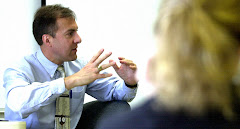Funny how we fight over the speculative.
The opening of the Creation Museum in northern Kentucky (not far from the Cincinnati-Northern Kentucky airport) is going to include a protest by a group calling itself DefCon. That's not a cold war-era relic group. It's a group of people who claim that what's going on inside this little museum is really scary for the rest of us thinking people (Check out a Kentucky version of the story at www.kentucky.com/181/story/78875.html, but don't miss the New York Times' version of it last week.)
What's at stake is the right to believe.
Ken Ham, founder of Answers in Genesis — the non-profit group that built the museum, notes the irony of those who attack what's in his museum under the notion that it's a threat to popular conceptions of pre-historic life on this planet.
The museum is getting it wrong, says Lawrence Krauss, a faculty member in physics and astronomy at Case Western Reserve University in Cleveland. In an interview with the Lexington Herald-Leader, Krauss said DefCon, which he's part of, fears that impressionable young people will come out of this museum and need re-education.
Last I heard the jury was still out on what the national curriculum should be on anything in this country — including the origins of human or any other life.
Fact is, scientists begin their research with hypotheses that — though based on some elements of fact — are essentially faith premises. If they're intellectually honest, they admit this and approach their research (and that of others doing inquiry in their field) with humility. They're ready to admit that their results are flawed and trace those flaws all the way back to their hypotheses, if necessary.
Ken Ham and those in his group have built a sanctuary for their point of view as to how life began on the earth. The basis for their scientifict scrutiny — and before Krauss and his group dismiss it as unscientific they're obliged to ask honest questions — happens to be a predisposition that forces beyond human reason or established empirical evidence were behind it all.
To shut Ken Ham and his group down smacks of the kind of treatment Galileo faced long ago when he dared ask questions that stepped outside the bounds of established thought.
Subscribe to:
Post Comments (Atom)



No comments:
Post a Comment